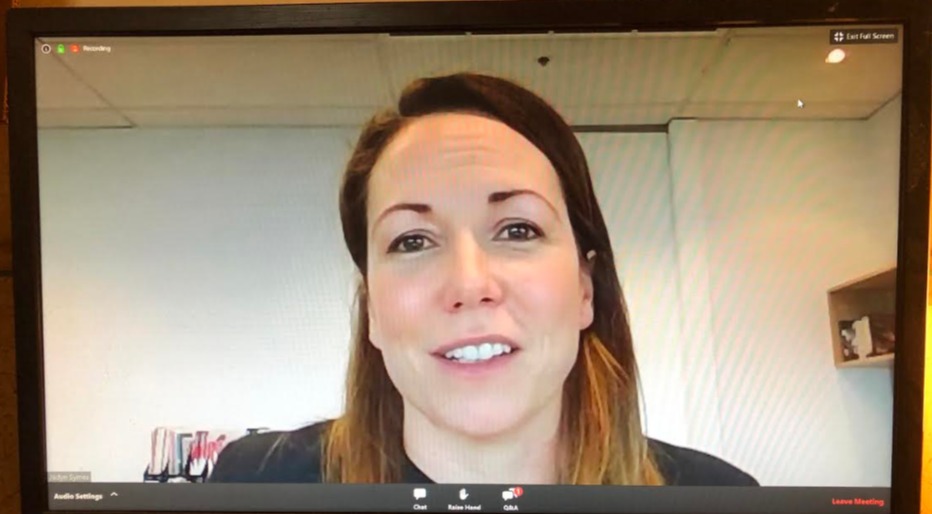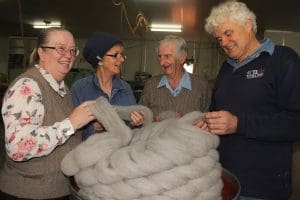
Victoria’s Minister for Agriculture Jaclyn Symes during yesterday’s RPCV webinar
VICTORIA’S Minister for Agriculture Jaclyn Symes has come out in support of expanding onshore wool processing in Australia as the COVID-19 pandemic disrupts global manufacturing and supply chains.
During a Rural Press Club of Victoria webinar yesterday to outline the Victorian Government’s vision for agriculture post COVID-19, Ms Symes said she saw merit in expanding investment into onshore wool processing in Australia.
“Not only as the coronavirus pandemic identified how important our agricultural sector is, it has again highlighted a desire for Australians to want to become more self-sufficient,” she said.
Ms Symes said she thought consumer preference “will almost drive us” to considering further investment in onshore wool processing capacity.
“As a government, particularly as the Minister for Regional Development, I am always interested in ideas and ways to create more country jobs, and if that is in the wool industry, I’m all ears.
During the webinar, Ms Symes said the coronavirus pandemic in a way has certainly served as reminder of the importance of regional industries like agriculture, mining, manufacturing and food processing – in delivering the everyday things that Victorians need and rely on.
“Victorians, Australians and the world have an almost unquenchable thirst for beverages, food, fibre and the things that we grow here in regional Victoria and we are working with the Federal Government to provide access to freight options for businesses whose normal distribution methods may be disrupted.
“It is obvious that demand for Victorian agricultural product will remain strong and this is good news, as it will ultimately mean more money in the pockets of farmers, food and fibre producers and will indeed create more jobs,’ she said.
“We know that the coronavirus will change the way the global economy works.
“In particular, it could lead to greater support for onshore product processing and manufacturing,” Ms Symes said.
“Of course, there are also investment opportunities, as agriculture is largely uncorrelated with financial markets.
“We may see investors increasingly look to ag as an alternative investment, providing capital to further increase the efficiency and productivity of our farms and supply chains.”
She said there has been a cultural reluctance in Australia on this that might shift as the nation strives for greater self-sufficiency.
Small-scale processors welcome minister’s comments

At Cashmere Connections inspecting coloured wool top, from left, Shirley Unthank, Trish Esson, John French and Charles Esson.
President of the Australian Fibre Collective and small-scale cashmere, wool and speciality fibre processor at Bacchus Marsh, Trish Esson, welcomed Ms Symes comments.
She said there was need for greater investment in onshore wool processing, especially in spinning, with only limited commercial spinning options available and many domestic manufacturers importing finished yarn from China for Australian-made garments.
“The word that we are hearing is that people are starting to take notice of where things are coming from.”
Ms Esson and her husband Charles run Cashmere Connections, processing cashmere, alpaca and wool.
“There are a number of knitters here who could knit commercial yarns if they were spun for them.
“The wool growers have put all their eggs in one basket, it (raw wool) predominantly goes to China,” she said.
“If something goes wrong with the Chinese end, or they do like they have done – threaten to cut off buying stuff – then where do the Australians go?”
“They need more markets.”
Ms Symes also announced expanded grant support for drought-impacted farmers during the webinar, adding to the $80 million-plus provided for drought and seasonal support since late last year. She said there has been relay good take up of the support available.

Full marks to Trish Esson, who has been a champion of wool processing. But before Victoria’s Minister for Agriculture gets too excited about re-igniting a local processing industry, I would suggest she first have a word with the Lemprieres, Michells and the Lillies, who have all been there done that.
In the 1980s, when the clip was double today’s output, Australia was scouring/carbonising nearly 30 percent of the clip. And top making was running at about 15pc.
But despite generous government support to get the local highly modernised ventures off the ground, the high cost of labour and energy — at least compared to the likes of China — sealed the fate for most local production.